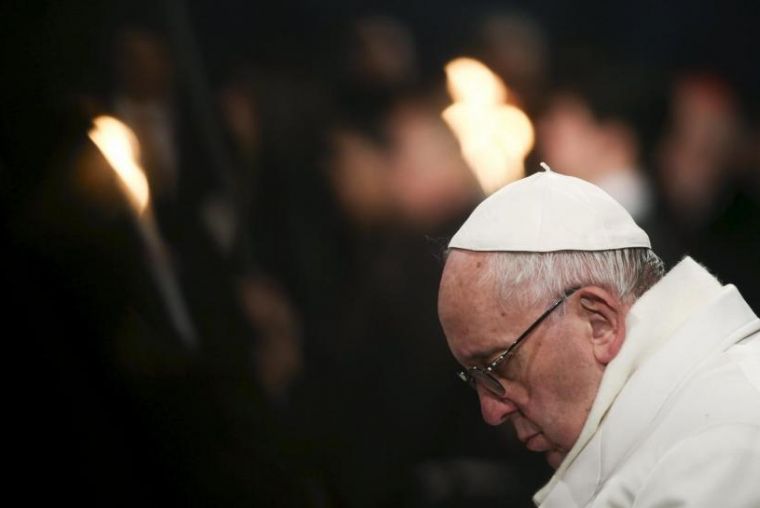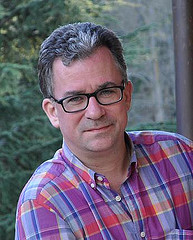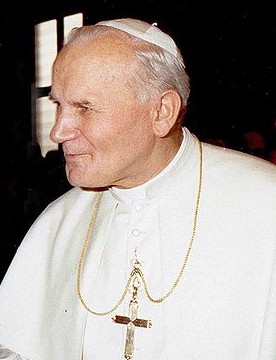Has the Pope gone soft on adultery? The Catholic Church's civil war

In March 2016, Pope Francis produced a document that sent shockwaves through the Catholic Church.
Divorced and remarried Catholics have always been forbidden from receiving Communion, because in the eyes of the Church, such a marriage is not seen as valid and amounts to 'adultery'.
But in his landmark encyclical Amoris Laetitia ('The Joy of Love'), Pope Francis seemed to pull the rug from under traditionalists by writing that in some circumstances Catholics in their second marriage could receive Communion, after all.
The ensuing row has seen him attacked by critics ranging from Cardinals to internet trolls who accuse him of nothing short of heresy.
This week, a Catholic bishop and several dozen priests, scholars and writers published what they described as a 'filial correction' of some of Francis's teachings about marriage, especially about access to the sacraments for divorced and civilly remarried Catholics – or 'unrepentent adulterers', to use the incendiary language of conservative Catholics.
The new letter accuses Pope Francis of 'the propagation of heresies effected by the apostolic exhortation Amoris Laetitia and by other words, deeds and omissions of Your Holiness.'
In Amoris Laetitia, Pope Francis asked pastors to 'accompany' those who have remarried civilly; to check whether their sacramental marriage was valid or if they could receive a decree of nullity; and to lead them in a process of discernment about their responsibility for the breakup and about their current situation in the light of church teaching. The document reflected discussions and conclusions from meetings in 2014 and 2015 of the Church's Synod of Bishops on the family.
There have been many interpretations of what Pope Francis meant to do, from critics and allies alike. According to the Catholic News Service, 'The document seemed to open the possibility – in certain cases and after the discernment process – of allowing them to receive absolution and Communion even without promising to abstain from sexual relations with their new partner.'
This week's 'filial correction' lists what its authors see as seven 'false and heretical propositions' in Amoris Laetitia including, allegedly: a belief that God's grace does not give a believer the strength to meet 'the objective demands of divine law'; that divorced and civilly remarried persons 'are not necessarily in a state of mortal sin'; that a person can break divine law and not be in a state of sin; that a person can decide in good conscience that sexual relations are morally permissible or even good with someone other than the person they married sacramentally; and that 'our Lord Jesus Christ wills that the Church abandon her perennial discipline of refusing the Eucharist to the divorced and remarried'. The letter asked the Pope publicly to reject the seven propositions.
There is, perhaps, an element of the trick question about this, as – according to experts – these are straw men which the Pope has not advocated.
Austen Ivereigh, who wrote a biography of Pope Francis called The Great Reformer, points out that, despite the title of his acclaimed book, the argument over Amoris Laetitia is a false one.

'The point of Amoris Laetitia is to allow the Church better to come alongside people in difficult or fragile situations where there aren't easy answers,' Ivereigh tells Christian Today.
'It doesn't say people who are divorced and or remarried can receive Communion – it definitely doesn't say that – but it doesn't say no either.
'That's the whole point. This is the problem with the discussion – they are missing the point: it is not as simple as yes or no. And that is what Amoris Laetitia is getting away from. It's calling for lots of things – all the focus has been on one chapter – but it says pastors should accompany people in this situation on a kind of retreat, look at the whole situation, the past, who was at fault, and at the end of that process it is saying neither yes nor no, but allowing flexibility.'
It is this area of apparent ambiguity that has paved the way for conservatives to accuse Pope Francis of allowing Communion for what are termed 'adulterers'.
Yet, as Ivereigh says: 'You cannot say that everyone who is divorced or remarried is an adulterer. Adultery is a moral category. A woman who is abandoned by her husband and remarries for the sake of her children – say, 15 years later – is she an adulteress? Is that an appropriate description?'
The most well known name among Francis' latest critics is Bishop Bernard Fellay, the superior general of the traditionalist Priestly Society of St Pius X, a group that is in talks with the Vatican aimed at regularising its status within the Catholic Church.
The letter was originally signed by 40 people and delivered to Pope Francis in August. The authors then said that they did not receive a response and released it publicly on September 24, at the same time launching a website: www.correctiofilialis.org.
The Vatican press office has not commented on the letter, except this week to deny that access to it had been 'blocked' on Vatican computers.
Greg Burke, the Vatican's head of communications, downplayed the claims, joking: 'You can't really imagine we would do this for a letter with 60 names.'
'Francis won't pay any attention – because what they do is ascribe to him a series of heresies and then invite him to condemn them,' says Ivereigh.
While the letter may be made up of what Ivereigh calls 'not a significant group of people – high school teachers and so on,' it followed a set of critical questions signed last September by the US Cardinal Raymond L Burke, and the German Cardinal Walter Brandmuller.
Along with two other cardinals who are now deceased, they publicly released the set of questions, known as 'dubia' that they had sent to Pope Francis about the same subject area.
In August, Cardinal Burke spoke in an interview about issuing a 'formal correction' of Pope Francis if he refused to respond to the 'dubia', taking the form of a declaration of church teaching.
For Ivereigh, such rumblings play into the hands of the secular media and secular coverage in turn only benefits the traditionalists. 'This has been the whole problem all along – a media frame that benefits conservatives,' he says.
Meanwhile, a very widespread misunderstanding builds up, that Pope Francis is changing Church doctrine or teaching.
'The way this has been framed is that the Pope is somehow liberalising Church teaching on divorce – and that is really not happening at all; Church doctrine on insolubility of marriage remains unchanged,' says Ivereigh.
'The context is where marriage has culturally broken down, where divorce is common including among Catholics, and there are pastoral situations, such as someone grows up, divorces, later remarries, comes back to Church, can't annul their first marriage – now there is no question of recognising the legitimacy of the second union, but bishops may feel that they can act, for example where the individual can't obtain an annulment for technical reasons, such as because they have moved country.
'That was the issue that Amoris Laetitia dealt with; it called on people in the Church not simply to apply the rules of the sacraments in a black and white way, but to walk alongside people.
'The Pope has effectively said after a very long period of Church discernment, that there should be greater latitude in the application of the rules on the sacramental disciplines.'
On the one hand, Amoris Laetitia does represent the culmination of a unique reforming message advocated by Pope Francis for several years.
'Francis has directly addressed these objections time and time again because he keeps talking about the logic of God versus the logic of the doctors of the law,' says Ivereigh, who points to his February 2015 address to Cardinals, in which Francis said: 'There are two ways of thinking and of having faith. We can fear to lose the saved, or we can want to save the lost.'
It is worth quoting at some length the Pope's words, that could define his approach to the papacy.
Jesus is not afraid of this kind of scandal! He does not think of the closed-minded who are scandalized even by a work of healing, scandalized before any kind of openness, by any action outside of their mental and spiritual boxes, by any caress or sign of tenderness which does not fit into their usual thinking and their ritual purity. He wanted to reinstate the outcast, to save those outside the camp...
There are two ways of thinking and of having faith: we can fear to lose the saved and we can want to save the lost. Even today it can happen that we stand at the crossroads of these two ways of thinking. The thinking of the doctors of the law, which would remove the danger by casting out the diseased person, and the thinking of God, who in his mercy embraces and accepts by reinstating him and turning evil into good, condemnation into salvation and exclusion into proclamation.
These words sound radical indeed, yet Ivereigh points out there is continuity. 'Basically I think he is not liberalising or modernising – he is actually restoring a long-standing Church tradition of discernment in the application of doctrine of the law.'
On the other hand, then, Francis is continuing the work of his very different two predecessors, Benedict XVI and John Paul II.
'Although people think he is contradicting previous Popes, he is not,' says Ivereigh. 'Francis was simply building on the space that was first opened by John Paul II.'
Ivereigh is referring to the John Paul II's own, post-synodal apostolic exhortation published in 1981, Familiaris Consortsio, which also talked of the need to distinguish and discern when it came to the issue of Communion for divorced and remarried Catholics.

Indeed this week, the President of the Pontifical Academy for Life Archbishop Vincenzo Paglia told Crux's John Allen that Pope Francis's position is 'about growth'.
He said that Pope John Paul II began the 'revolution' in the Church for Communion for the divorced and remarried, and that Pope Francis is continuing this as the saint's 'best interpreter'.
Paglia said: 'Pope Francis has carried forward, lifted up, certain intuitions present in Familiaris Consortio that weren't really made explicit in a terribly high-profile way.'
A 'clear example' of this, he said 'is the divorced and remarried'.
He continued: 'The real revolution there happened under John Paul II, not Francis, which hasn't really yet been understood. You have to remember that before [Familiaris Consortio], it wasn't that the divorced and remarried just couldn't get Communion, it was they were practically excommunicated and expelled. They were outsiders. After John Paul, everybody was inside the house...I can't just send them out on the terrace!'
In Familiaris Consortio, John Paul II wrote:
'Reconciliation in the sacrament of Penance which would open the way to the Eucharist, can only be granted to those who, repenting of having broken the sign of the Covenant and of fidelity to Christ, are sincerely ready to undertake a way of life that is no longer in contradiction to the indissolubility of marriage. This means, in practice, that when, for serious reasons, such as for example the children's upbringing, a man and a woman cannot satisfy the obligation to separate, they take on themselves the duty to live in complete continence, that is, by abstinence from the acts proper to married couples.
Nonetheless, Paul Vallely, the author of Pope Francis - Untying the Knots: The Struggle for the Soul of Catholicism, argues that Pope Francis is a unique pastor. Vallely tells Christian Today: 'The last Pope was a theologian. The Pope before him was a philosopher. By contrast this Pope is a pastor. So it's hardly surprising that Catholics find a different emphasis from these three men who have been formed in their faith in different ways.
'Pope Francis has demonstrated to the world that there are different ways of being a Catholic than being a rigorist or legalist. He sees the message of the gospel as one which puts mercy before judgment. He wants what one theologian has called "a Church for grown-ups" where Catholics develop in maturity in their relationship to God, rather than just being told what to do.'
Catherine Pepinster, the former editor of The Tablet and author of the forthcoming book, The Keys and the Kingdom: the British and the Papacy from John Paul II to Francis, says that this distinctly pastoral Pope is indeed performing a balancing act.

'Pope Francis has tried to help people who are remarried and want to receive Communion without sweeping aside hundreds of years of doctrine,' she says. 'In Amoris Laetitia, the suggested way forward is discernment, case by case work between a couple and their priest. But his critics want teaching on marriage as a lifelong commitment rigidly enforced and people barred from Communion. But that is a perception about Communion being a reward for being a stickler for the rules. It's not. It's nourishment for the soul, for people who fail and for people who try to do their best.
'Pope Francis's watchword is mercy and he's trying to give people wiggle room regarding their remarriages and Holy Communion. There may be critics voicing their opposition to this, but there are countless Catholics who find the Pope's approach much more attractive, pastoral – and in keeping with the Church's teaching.'
Yet for some (very) liberal Catholics, the current Pope is indeed pitted against his own Church. Joanna Moorhead, the Catholic author and writer for the Guardian and The Tablet, says: 'I think the Pope is more interested in issues like ending wars and poverty, and all power to him on those fronts. The Catholic Church has been obsessed with issues of private morality for too long; that's not to say they're not important, but it's been at the expense of other really big things like the morality of war and the morality of capitalism.
'I think this Pope wants to leave issues of private morality to the pastors on the ground, bishops and priests, and to concentrate on the public morality issues himself. But of course there are many factions in the Catholic Church who have an investment in those private morality issues, or who genuinely believe that the head of the Catholic Church must pronounce on them, and that it's important that he does.

'My impression of the Pope is that what keeps him awake at night isn't whether a divorced Catholic is having communion or not; it's whether people are killing one another in wars, and whether people are dying because they don't have enough, in a world where there should be plenty for all.
'And I think there are people out there who are very uncomfortable about what it might mean for the Catholic Church if we shift our gaze away from the bedroom and towards social justice; they're far happier sticking to what they think they know, the "small stuff" of belief, the issues of private and personal faith.'
This is a popular view outside the Church, and may be wishful thinking. But many argue that the attacks on Pope Francis miss the point.
This week, the Canadian Cardinal Marc Ouellet, who serves as the Vatican's prefect of the Congregation for Bishops, told Canadian bishops that the document does not signal 'changes to doctrine or to sacramental discipline,' but instead represents a pastoral approach that takes into consideration 'the good of the person,' according to his or her circumstances.
The Cardinal added that 'any alarmist interpretation' that says the document is 'a break with tradition,' or a 'permissive interpretation that celebrates access to the sacraments' for the divorced and remarried is 'unfaithful to the text and to the intentions of the supreme pontiff'.
For Vallely, the growth in criticism, especially over the internet, presents an irony. 'Under Pope John Paul II and, to a lesser extent under Pope Benedict XVI, disagreement was branded as dissent. Theologians were silenced. Priests were disciplined. Some were even excommunicated for their writings. By contrast Pope Francis sees disagreement as healthy debate rather than dangerous dissent,' he says.
'The ironic result is that critics of the Pope can be unconstrained in what they say. Some have even capitulated to the vitriol of Internet communication in their language. Under previous Popes such individuals would have been silenced directly or been intimidated into silence by an ecclesiastical a climate of fear. Ironically, then, the vocal minority sticking their head above the parapet to criticise the Pope reflect the fact that the Church is now more open and a greater forum for healthy debate.'
Whatever the criticism, the reality, says Austen Ivereigh, is that Amoris Laetitia is making its mark on the ground.
'My sense is that Amoris Laetitia is being received and applied gradually,' Ivereigh says. 'There are more and more books on its applications; bishops are issuing guidelines; it will be received in the long term.
'It is not the first papal document that has been resisted by a handful of bishops and objected to buy a group of traditionalists.
'But the Cardinals I've spoken to are in no doubt that this is magisterial teaching and it is here to stay.'











